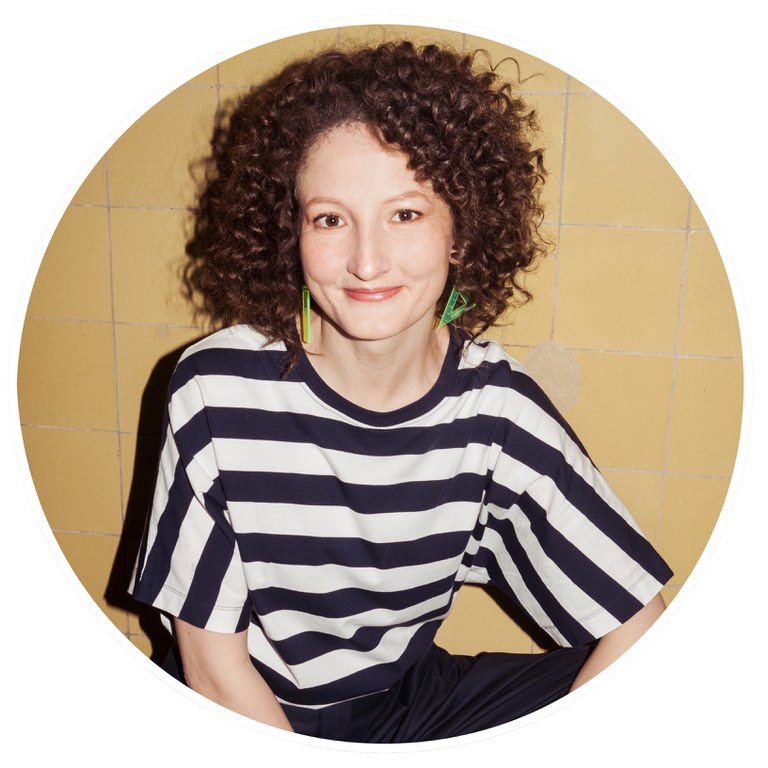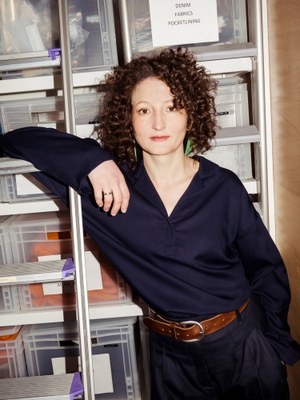'Every product made and consumed means there is damage to the environment, so there are no such things as sustainable products'
The recent marketing campaign of ARMEDANGELS states, "Sustainable products don't exist." Can you elaborate on the rationale behind this statement and how it aligns with the brand's values?
As before, we are committed to the highest standards for people and planet. We however find it crucial to start moving the discourse away from the concept of a ‘sustainable product’. Every product made and consumed means there is damage to the environment, so there are no such thing as sustainable products. Therefore, we’re communicating clearly that any new purchase adds to the footprint consumers have.
What are your commitments?
We are GOTS and GRS certified brand. This means, our operations as well as all relevant supply chain steps down to farm or recycling facility are independently certified by a third party for environmental and social criteria (according to the GOTS and GRS requirements). We are FairWear member and since many years we enjoy a confirmed ‘leader’ status, according to their independent rating of brands and the work brands do on human rights. No AA product is destined to waste – we support options for reselling (secondhand shop online) and would also take back products that are not sellable, to ensure they get the best value they still can – be donated or recycled. We have strict requirements for the materials we are sourcing. For example, in case of cotton (that is our biggest material) we do not source any conventional cotton, but exclusively organic or recycled. Similarly, we have strict requirements on other material types. You can read about our material strategy in our latest action report. Our material commitments and resulting material portfolio is ranked with a leader status by Textile Exchange in their industry benchmark, in terms of adopting the preferred raw materials.
ARMEDANGELS has introduced charges for returns in its online shop to discourage frivolous returns associated with fast fashion. Could you share more details about this strategy and how you envision it influencing consumer behavior?
Every newly purchased product should be chosen wisely. Quality over quantity. That's why we've decided to charge for our returns. With this action, we want to promote conscious consumption and ensure that only items that are unwanted or damaged are returned.
We want to emphasize that we still have a fair return policy that informs our customers when and why return fees are charged. We also offer tips to help our customers avoid returns, which not only saves them time and stress, but can also reduce the carbon footprint by saving on transportation and packing materials. We are convinced that together with our customers, we can make a difference if everyone does their part, no matter how small, medium or large.
ARMEDANGELS emphasizes the importance of transparency and precision in its communications. How does the brand plan to educate consumers about the environmental impact of clothing production and the need for conscious consumption without overwhelming them or discouraging them from engaging with the brand?
We use our platforms, such as our website and social media channels, to provide tips for a more conscious lifestyle and information about our fabrics and suppliers. This includes washing tips, a repair guide for simple repairs to garments so they can be worn longer. We recommend podcasts and books that promote a more sustainable lifestyle and provide incentives to change daily habits to reduce one's carbon footprint. In this way, together with our customers, we make an important contribution to conserving our valuable resources. Because it's up to all of us to fight for a better future and adapt our lifestyles to achieve it.
Here’s a little preview of what we are working on at the moment. Coming up soon, we will test a ‘handprint’ pilot, offering our customers support to enable them to make lifestyle choices that reduces their carbon footprint. We will estimate the impact of this pilot in tons of CO2 reduced by consumers, based on the power of the change and the number of people who may decide to make the change with our support. At the moment, we can’t give too many details yet, but stay tuned.
Where does ARMEDANGELS have its clothing produced? And how does the company ensure where the primary products or raw materials come from or where they are produced?
We are transparently publishing our Tier 1 suppliers and working to have a fully transparent supply chain. For example, we use blockchain to trace the origin of our wool and Lenzing fibers back to the spinning mill. We are also testing innovative approaches such as the physical tracer or the RFID chip. This is not an easy task and we are not there yet, but we are constantly working to improve.
Currently we have producing suppliers in Germany, Portugal, Türkiye, Romania and Tunisia. To build transparent and traceable supply chains – from field to factory - takes tenacity and time. So, we get up-close and personal with all our suppliers, visiting their locations regularly, getting to know the people and the problems behind the process. Our suppliers are the critical link in maintaining a fair and equitable supply-chain, providing transparency on subcontractors and their suppliers, supporting us with data collection on climate impacts (e.g. carbon footprint) as well as social impacts (e.g. wage data) and working towards improving the data systems. Honesty makes the world.
Let ́s talk about the Living Wage Project. This is a unique pilot project in collaboration with three like-minded brands and your shared supplier, Mergü, Turkey. Can you tell us more about the project's objectives and how does ARMEDANGELS approach the issue of fair wages, especially considering that you don't own any factories?
We’ve joined forces with like-minded brands and our shared supplier Mergü in Turkiye to launch this unique pilot project. Together we have a higher leverage and can make a real difference for all. The aim: To bring fair living wages to all the production workers at the Mergü factory.
We consider it a lighthouse project because it is unique in its set-up, as we as brands openly work together towards our shared goal of supporting the suppliers and their workers. The project has grown in the meantime as more brands have joined or are interested in joining. This is what we have hoped for. The more, the better!
Toteme also joined the Living Wage Project. We can't say anything about the other brands, as they have shown interest but have not yet decided internally to participate in the project.
We as brands don’t pay wages directly to the garment workers since we don’t own any factories. All our partners are individually owned entities. We, however, pay prices for the garments we buy from them. These prices need to be fair. We at ARMEDANGELS set a high degree of transparency and also demand this from our partners.
We’ve been extremely busy implementing our True Costing methodology over the past few years, which makes price negotiations almost obsolete and wage payment as transparent as possible. We set the goal to always pay 20% above minimum wages for all suppliers. Currently, we are evaluating actual wages of all our suppliers twice a year. Because it’s only fair if it’s fair for everyone.
Could you elaborate on ARMEDANGELS’ True Costing methodology and how it contributes to ensuring fair wages for workers? How does it make price negotiations almost obsolete and enhance transparency in wage payments?
For the past few years we’ve implemented our TRUE COSTING METHODOLOGY - a system where all costs (inc. labor) are transparent in our prices. To simplify the process, we tested the FAIR PRICE app- successfully. These are key tools to ensure fairness and transparency for garment workers at all levels. Since the beginning of the project in December 2020, ARMEDANGELS’ contribution towards the Living Wage Bonus was around 130.000€, which covered 5 seasons and was distributed to around 120 workers, on top of their wages. Mergü and all brands are actively encouraging other customers to participate in the project, to further improve the impact and spread more awareness.
Some argue that the responsibility for sustainable fashion lies with the consumers, who need to make conscious choices. Others believe that fashion brands hold the key to driving change through their production and marketing practices. What are your thoughts on this ongoing debate?
Yes and yes. We are all responsible to fight climate change – companies, customers, politics. To conquer the climate crisis, everyone has to make more sustainable choices.
We are doing both, exactly as it’s described in the question. We defined our Impact Strategy to track our carbon footprint, as well as our carbon handprint. An overview of how & where we take responsibility can be found in our Mission Hub or Action Report.
We are taking responsibility by producing products with the lightest planetary touch possible, drastically reducing the carbon emission. Additionally we use our platform to push greener lifestyle choices, to enable costumers to extend this in their consumer behavior.
To keep our ecological footprint as low as possible, we as a brand rely on recycled materials and recyclable products that are easily recyclable. A large part of our clothing is therefore already made from a material to facilitate recycling. We also offer our customers the opportunity to return ARMEDANGELS items they no longer wear to us so that we can give them a second chance in our online second-hand shop or recycle them. In this way, together with our customers, we make an important contribution to the conservation of our valuable resources. As you can see, for a more sustainable future we all have to work hand in hand.

Katya Kruk is an environmental scientist. She is responsible for the planning and implementation of the global sustainability strategy at ARMEDANGELS and leads the drive for innovation. Previously, Kruk was responsible for innovation and material analysis at Adidas for over four years.

